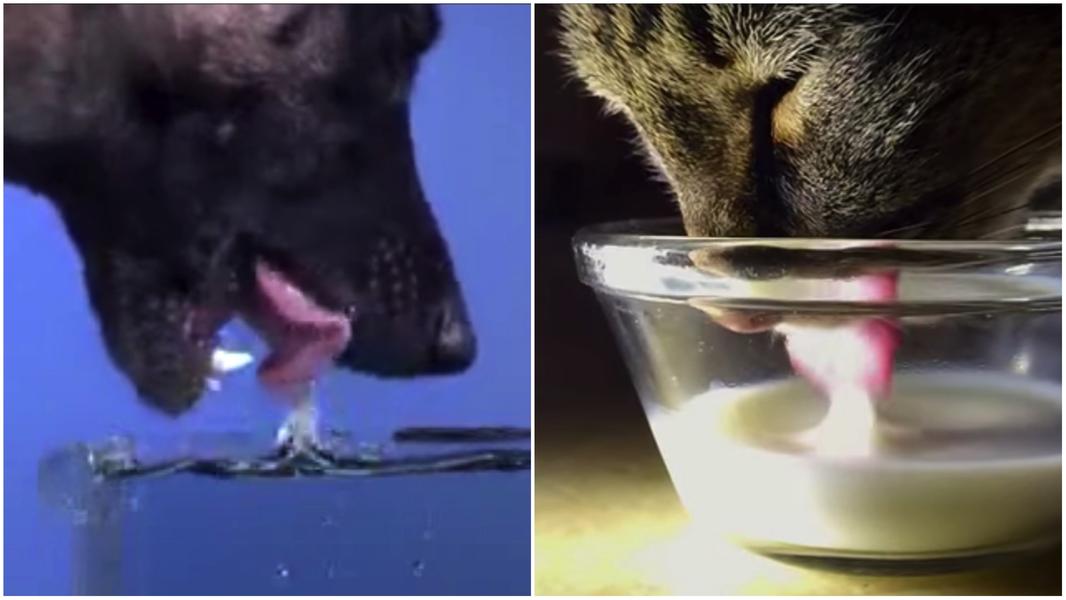Science explains why cats are so much neater drinkers than dogs


A free daily email with the biggest news stories of the day – and the best features from TheWeek.com
You are now subscribed
Your newsletter sign-up was successful
The first thing you might notice from this story is that multiple scientists at multiple universities study how domestic pets consume liquids. "Three years ago, we studied how cats drink," biomechanics engineer Sunny Jung explains with refreshing candor. "I was curious about how dogs drink, because cats and dogs are everywhere."
Jung, an associate professor at Virginia Tech, and his fellow researchers are presenting their findings on "How Dogs Drink Water" at the American Physical Society's fluid dynamics division meeting in San Francisco. Neither cats nor dogs can suck in liquids, since they have "incomplete cheeks" — the better to catch prey with their jaws — so they rely on gravity-defying tongue action to move liquid into their mouths.
Cats, previous research has shown, use the tip of their tongues to pull up a neat column of water, then snap their mouths to drink it. "When we started this project, we thought that dogs drink similarly to cats," Jung said in a press release. "But it turns out that it's different, because dogs smash their tongues on the water surface — they make lots of splashing — but a cat never does that." Dogs not only use a broader surface of their tongues than cats, but it turns out that bigger dogs use more of their tongues — and thus make a bigger splash and a bigger mess — than smaller dogs.
The Week
Escape your echo chamber. Get the facts behind the news, plus analysis from multiple perspectives.

Sign up for The Week's Free Newsletters
From our morning news briefing to a weekly Good News Newsletter, get the best of The Week delivered directly to your inbox.
From our morning news briefing to a weekly Good News Newsletter, get the best of The Week delivered directly to your inbox.
You can watch a video of a dog drinking, plus the physics behind it and impressive modeling the researchers used, below or at the researchers' presentation page. And Discovery News has video clips of a cat and dog drinking in slow motion, for comparison purposes. --Peter Weber
A free daily email with the biggest news stories of the day – and the best features from TheWeek.com
Peter has worked as a news and culture writer and editor at The Week since the site's launch in 2008. He covers politics, world affairs, religion and cultural currents. His journalism career began as a copy editor at a financial newswire and has included editorial positions at The New York Times Magazine, Facts on File, and Oregon State University.
-
 What are the best investments for beginners?
What are the best investments for beginners?The Explainer Stocks and ETFs and bonds, oh my
-
 What to know before filing your own taxes for the first time
What to know before filing your own taxes for the first timethe explainer Tackle this financial milestone with confidence
-
 The biggest box office flops of the 21st century
The biggest box office flops of the 21st centuryin depth Unnecessary remakes and turgid, expensive CGI-fests highlight this list of these most notorious box-office losers
-
 Blue Origin launches Mars probes in NASA debut
Blue Origin launches Mars probes in NASA debutSpeed Read The New Glenn rocket is carrying small twin spacecraft toward Mars as part of NASA’s Escapade mission
-
 Dinosaurs were thriving before asteroid, study finds
Dinosaurs were thriving before asteroid, study findsSpeed Read The dinosaurs would not have gone extinct if not for the asteroid
-
 SpaceX breaks Starship losing streak in 10th test
SpaceX breaks Starship losing streak in 10th testspeed read The Starship rocket's test flight was largely successful, deploying eight dummy satellites during its hour in space
-
 Rabbits with 'horns' sighted across Colorado
Rabbits with 'horns' sighted across Coloradospeed read These creatures are infected with the 'mostly harmless' Shope papilloma virus
-
 Lithium shows promise in Alzheimer's study
Lithium shows promise in Alzheimer's studySpeed Read Potential new treatments could use small amounts of the common metal
-
 Scientists discover cause of massive sea star die-off
Scientists discover cause of massive sea star die-offSpeed Read A bacteria related to cholera has been found responsible for the deaths of more than 5 billion sea stars
-
 'Thriving' ecosystem found 30,000 feet undersea
'Thriving' ecosystem found 30,000 feet underseaSpeed Read Researchers discovered communities of creatures living in frigid, pitch-black waters under high pressure
-
 New York plans first nuclear plant in 36 years
New York plans first nuclear plant in 36 yearsSpeed Read The plant, to be constructed somewhere in upstate New York, will produce enough energy to power a million homes
